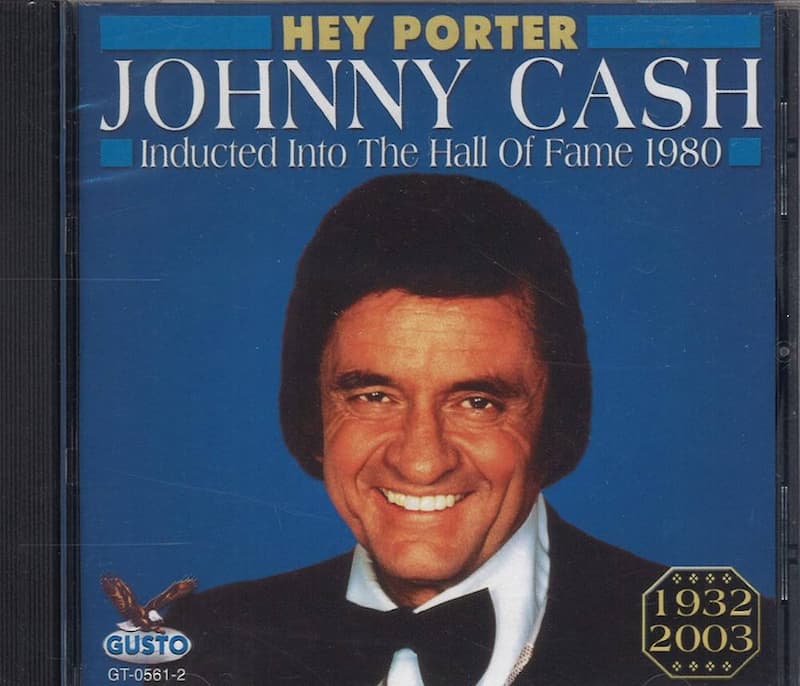
About The Song
“Hey Porter” was written by Johnny Cash in 1954, inspired by his experiences as an Air Force serviceman returning home to Arkansas by train after his discharge. The song captures the excitement of a soldier eager to return to the South, addressing a train porter to speed up the journey. It was recorded on September 1, 1954, at Sun Studio in Memphis, Tennessee, produced by Sam Phillips. Released as a single in June 1955 by Sun Records, it was the B-side to Cash’s debut single, “Cry! Cry! Cry!,” and later included on the compilation album All Aboard the Blue Train in 1962. The track, running 2:13, is a country-rockabilly song featuring Cash’s distinctive vocals, Luther Perkins’ minimalist guitar, and Marshall Grant’s upright bass.
As the B-side to “Cry! Cry! Cry!,” “Hey Porter” did not chart independently on the Billboard Best Sellers in Stores (country) chart, where the A-side peaked at number 14 in July 1955. Billboard did not track B-sides separately during this period, and the Hot 100 was not yet established. The single’s regional success, particularly in the South, helped establish Cash’s early career, with “Hey Porter” contributing to its jukebox popularity. Internationally, it had minimal chart impact due to limited distribution. Cash Box described it as a “lively, narrative-driven tune” with “raw, authentic energy,” noting its appeal to country audiences. The song’s sales were tied to the A-side’s success, exceeding 100,000 copies.
Background details include Cash writing the song while stationed in Germany, initially as a poem, before adapting it into a song upon joining Sun Records. It was one of the first tracks he pitched to Sam Phillips, who saw its potential after rejecting Cash’s earlier gospel demos. Recorded with the Tennessee Two in a single session, it showcased their signature “boom-chicka-boom” sound. Covers include versions by Ry Cooder (1972) and Marty Stuart (1994). Cash performed it on the Louisiana Hayride radio show in 1955, boosting his visibility. No controversies surrounded the song, though its upbeat tone contrasted with the heartbreak themes common in Cash’s early work.
Expert commentary includes AllMusic’s Stephen Thomas Erlewine, who called it a “vibrant, storytelling debut” that set the stage for Cash’s career. Songfacts noted its role in introducing Cash’s train-inspired songs, a recurring theme in his catalog. Billboard archives praised its “infectious rhythm” and regional authenticity. The song’s inclusion in the 2005 film Walk the Line, performed by Joaquin Phoenix, and its use in a 2011 episode of Justified highlight its enduring appeal. Cash often included it in early live sets, such as his 1956 Grand Ole Opry appearance, cementing its place as a foundational track in his legacy.
Video
Lyric
Hey, porter! Hey, porter! Would you tell me the time?
How much longer will it be till we cross that Mason-Dixon Line?
At daylight will you tell that engineer to slow it down?
Or better still, just stop the train, ‘cause I want to look aroundHey, porter! Hey, porter! What time did you say?
How much longer will it be till I can see the light of day?
When we hit Dixie will you tell that engineer to ring his bell?
And ask everybody that ain’t asleep to stand right up and yellHey, porter! Hey, porter! It’s getting light outside
This old train is puffin’ smoke and I have to strain my eyes
But ask that engineer if he will blow his whistle please
‘Cause I smell frost on cotton leaves and I feel that southern breezeHey, porter! Hey, porter! Please get my bags for me
I need nobody to tell me now that we’re in Tennessee
Go tell that engineer to make that lonesome whistle scream
We’re not so far from home, so take it easy on the steamHey, porter! Hey, porter! Please open up the door
When they stop this train, I’m gonna get off first, ‘cause I can’t wait no more
Tell that engineer I said, “Thanks for the ride”
And ask him not to cry, ‘cause I’m gonna be all right